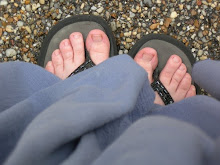
I've been wading through all of this unbelievable junk and wondering if I should have given the world to the monkeys.
~ Elvis Costello (God's Comic)
One of the most surprising and refreshing results of the Great Emergence event was coming away with a better understanding of Emergent's critics. I specify Emergent's critics, because the whole emerging/Emergent/missional/progressive/et al clarification debate that used to seem trivial to me made more sense after that weekend, as well.
To be quite honest, it was relieving to get the broader perspective. I haven't spent much time reading the Emergent guys, though I haven't had particular conflicts with most of what I had read. I tend toward an anabaptist bent, so seeing that there is room in whatever is "emerging" for various theological & denominational expressions was interesting.
What I felt like I received over that weekend was a clearer historical and sociological overview of the changes in the church over the past several decades, and I was able to weave my own story into that timeline. Not only did I feel like I understood guys like Al Mohler and John MacArthur, but Phyllis Tickle insists that they play an essential role in this time of transition. Now, Ms. Tickle did not name Mohler and MacArthur specifically, but she did speak of the far "corners" of each quadrant (liturgicals, social justice, renewalists, conservatives) as serving as sort of safety breaks as the process of blending between the quadrants progresses. Since my ecclesial history was planted firmly in the conservative quadrant, I include the SBC Reformed spokesmen as my bumper corners.
After listening to Phyllis Tickle's presentations, I began to connect dots. I understood why my decision to major in Philosophy and Sociology was perceived strangely by many on my conservative Christian college campus. I realized what was stirring when I read (and enjoyed) books like Peter Berger's The Social Construction of Reality or Harvey Cox's The Secular City... for fun (while many of my classmates were fleeing in terror). I understood why my paper using Sarte's Being and Nothingness to explain the salvation experience was considered odd. For the first time I think I fully understood what was driving me when I made the decision my senior year to avoid Seminary and even postpone (I thought temporarily) pursuing a "secular" doctorate in favor of experiencing life outside of the ivory tower. I understood a strange (to me) conversation I had with someone at the CCDA conference who, while he respected what we were doing, felt that we were too focused on orthopraxy and he felt it was more important to cling to orthodoxy (I thought we were just doing what Jesus told us to do). I understood what has been driving my questions about Church, and why I can't just "let it go" like so many have told me to do. I even understood more recent, hurtful conversations where my questions were dismissed as simply a generational distrust of authority.
Obviously I'm not trying to encapsulate a full understanding of what the Great Emergence is or what my theological or ecclesiological views are through this post. The point is that through this gathering I got a glimpse of the forrest made up by all of the little trees I've been climbing over the past decade, and it was breathtaking. I'm not so bothered by those who's perspectives can not make room for where I am, where I've come from and where I'm going. I'm not so bothered when they insist that they are absolutely right and I am absolutely wrong. I don't feel any more compelled to debate them than I do to receive their criticism - but I do feel compelled to love them.

3 comments:
No joke, as I'm reading this blog post, I look to my left and see Phyllis Tickle's book The Great Emergence.
My roommate Matt is finishing a PhD in the sociology of American Religion and has done a lot of reading on the Emergent movement.
Wish I could have been there with you.
Sociology of American Religion? I want his reading list!
Oh, and I said this event was better than the other conferences I've attended... I didn't say it was better than talking Church over coffee in Portland!
Portland awaits your return, my friend.
Post a Comment